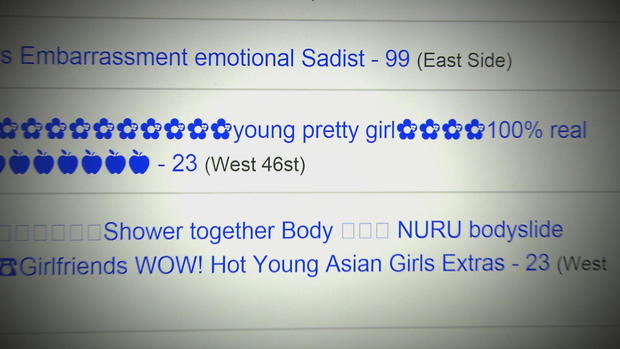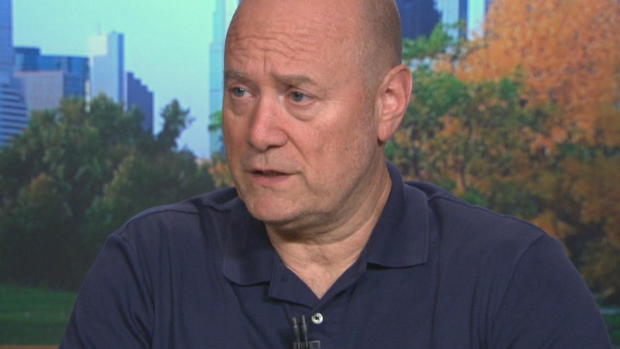Does Backpage.com help or hinder efforts to stop sex trafficking?
A bipartisan group of 47 lawmakers – almost half of the Senate – is co-sponsoring a bill to close what it sees as a loophole that supports an online market for sex trafficking. They want to remove legal protections for websites that host prostitution ads, but some in law enforcement warn the effort could be counterproductive.
The National Center for Missing and Exploited Children says classifieds website Backpage.com is involved in nearly three-quarters of all reports of online child sex trafficking that it receives from the general public, reports CBS News correspondent Anna Werner. A Senate investigation showed adult ads proved to be big business for Backpage, generating more than 90 percent of its ad revenue in 2011. Some victims' advocates want the site shut down. But is it that simple?
Chicago police use Backpage for undercover sting operations. They post ads on the site and according to Commander Bill Leen, who heads Cook County's vice unit, they get responses within a minute or two. Leen said sometimes they'll get 50 to 100 calls in one night from one of their ads. That's despite the fact that Backpage shut down its "adult" advertising section earlier this year under pressure from lawmakers. Now, police say they find ads for sex with young girls in the website's dating section.
"I honestly, even being a former prosecutor, I couldn't believe what I was seeing," said Cook County Sheriff Tom Dart.
Dart says many of the girls advertised are victims of sex trafficking.
"I was naïve," said one teenage girl who says she is a victim of sex trafficking. She says a pimp seduced her when she was just 14 years old and convinced her to post on Backpage.
"There was, like, hundreds of guys responding to the ad," she said.
She says the pimp told her to book appointments with men, then send him the money. On a good day, she says would make about $1,000 -- meaning appointments with about four men. The pimp even branded her with a tattoo. He later plead guilty to human trafficking and is serving eight years in prison. Now she's filed a lawsuit accusing Backpage of negligence among other allegations.
"They're letting all of this happen on their website. I mean, without Backpage, I would have never been in any of this in the first place," she said.
"Backpage has a primary purpose and it's to sell sex. Backpage has not done anything to ensure the safety of the kids on there, period," the teen's mother said.
The company recently settled a similar lawsuit in Washington, but it's also won several legal decisions in part because of a federal law called the Communications Decency Act. The company has argued in court filings that under the act, "websites cannot be held liable for publishing or editing content provided by third-party users".
However, a Senate report alleges Backpage "knowingly concealed evidence" of child sex trafficking through its editing "by deleting words, phrases, and images indicative of criminality". Senate investigators said words like "young," "little girl" and "innocent" were removed while "the remainder of the ad would be published."
At a congressional hearing in January, Backpage executives took the fifth.
The company also declined an on-camera interview, but a representative told CBS News that senators are conducting a "witch hunt" against the site. Backpage says it cooperates with police departments to help find victims and some police like Minneapolis Sergeant Grant Snyder – a sex trafficking investigator – agree.
"In some cases, we just tell them we've got a victim out there and we need to recover this individual and they respond very rapidly to that," Snyder said.
Snyder also agrees with Backpage that if ads aren't on their site, they'll pop up somewhere else – on sites that may not be as helpful to police.
"I think that if we eliminated Backpage today, you would see the same level of commercial exploitation occurring in other venues," he said.
Sheriff Dart doesn't buy the argument.
"I would hope our bar would be a lot higher than that. That your entire logic behind it is, like, 'Well, it could be just really, really worse. So just allow this to continue to go on,'" Dart said.
Sheriff Dart pressured credit card companies to stop doing business with the site. Backpage is now suing him for that, saying it violated the First Amendment and the Communications Decency Act.
A Senate committee last week approved legislation that would revise that law to specify it doesn't provide protection for sex trafficking. The bill now heads to the full Senate for consideration.






